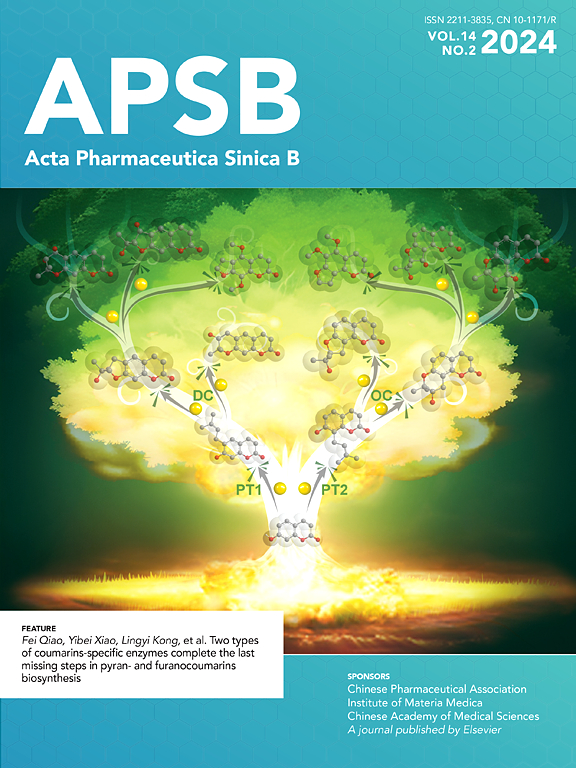USP51/GRP78/ABCB1 axis confers chemoresistance through decreasing doxorubicin accumulation in triple-negative breast cancer cells
IF 14.7
1区 医学
Q1 PHARMACOLOGY & PHARMACY
引用次数: 0
Abstract
Recent studies have indicated that the expression of ubiquitin-specific protease 51 (USP51), a novel deubiquitinating enzyme (DUB) that mediates protein degradation as part of the ubiquitin‒proteasome system (UPS), is associated with tumor progression and therapeutic resistance in multiple malignancies. However, the underlying mechanisms and signaling networks involved in USP51-mediated regulation of malignant phenotypes remain largely unknown. The present study provides evidence of USP51's functions as the prominent DUB in chemoresistant triple-negative breast cancer (TNBC) cells. At the molecular level, ectopic expression of USP51 stabilized the 78 kDa Glucose-Regulated Protein (GRP78) protein through deubiquitination, thereby increasing its expression and localization on the cell surface. Furthermore, the upregulation of cell surface GRP78 increased the activity of ATP binding cassette subfamily B member 1 (ABCB1), the main efflux pump of doxorubicin (DOX), ultimately decreasing its accumulation in TNBC cells and promoting the development of drug resistance both in vitro and in vivo. Clinically, we found significant correlations among USP51, GRP78, and ABCB1 expression in TNBC patients with chemoresistance. Elevated USP51, GRP78, and ABCB1 levels were also strongly associated with a poor patient prognosis. Importantly, we revealed an alternative intervention for specific pharmacological targeting of USP51 for TNBC cell chemosensitization. In conclusion, these findings collectively indicate that the USP51/GRP78/ABCB1 network is a key contributor to the malignant progression and chemotherapeutic resistance of TNBC cells, underscoring the pivotal role of USP51 as a novel therapeutic target for cancer management.
USP51/GRP78/ABCB1轴通过减少阿霉素在三阴性乳腺癌细胞中的积累而赋予化疗耐药
最近的研究表明,泛素特异性蛋白酶51 (USP51)是一种新的去泛素化酶(DUB),作为泛素-蛋白酶体系统(UPS)的一部分介导蛋白质降解,与多种恶性肿瘤的肿瘤进展和治疗耐药性有关。然而,usp51介导的恶性表型调控的潜在机制和信号网络在很大程度上仍然未知。本研究提供了USP51在化疗耐药三阴性乳腺癌(TNBC)细胞中作为突出DUB功能的证据。在分子水平上,USP51的异位表达通过去泛素化作用稳定了78 kDa的葡萄糖调节蛋白(glucse - regulated Protein, GRP78)蛋白,从而增加其在细胞表面的表达和定位。此外,细胞表面GRP78的上调增加了阿霉素(DOX)的主要外排泵ATP结合盒B亚家族成员1 (ABCB1)的活性,最终减少了其在TNBC细胞中的积累,促进了体外和体内耐药的发展。在临床上,我们发现USP51、GRP78和ABCB1在TNBC化疗耐药患者中的表达存在显著相关性。USP51、GRP78和ABCB1水平升高也与患者预后不良密切相关。重要的是,我们发现了一种针对USP51的替代干预方法,用于TNBC细胞的化学致敏。总之,这些发现共同表明,USP51/GRP78/ABCB1网络是TNBC细胞恶性进展和化疗耐药的关键因素,强调了USP51作为癌症管理的新治疗靶点的关键作用。
本文章由计算机程序翻译,如有差异,请以英文原文为准。
求助全文
约1分钟内获得全文
求助全文
来源期刊

Acta Pharmaceutica Sinica. B
Pharmacology, Toxicology and Pharmaceutics-General Pharmacology, Toxicology and Pharmaceutics
CiteScore
22.40
自引率
5.50%
发文量
1051
审稿时长
19 weeks
期刊介绍:
The Journal of the Institute of Materia Medica, Chinese Academy of Medical Sciences, and the Chinese Pharmaceutical Association oversees the peer review process for Acta Pharmaceutica Sinica. B (APSB).
Published monthly in English, APSB is dedicated to disseminating significant original research articles, rapid communications, and high-quality reviews that highlight recent advances across various pharmaceutical sciences domains. These encompass pharmacology, pharmaceutics, medicinal chemistry, natural products, pharmacognosy, pharmaceutical analysis, and pharmacokinetics.
A part of the Acta Pharmaceutica Sinica series, established in 1953 and indexed in prominent databases like Chemical Abstracts, Index Medicus, SciFinder Scholar, Biological Abstracts, International Pharmaceutical Abstracts, Cambridge Scientific Abstracts, and Current Bibliography on Science and Technology, APSB is sponsored by the Institute of Materia Medica, Chinese Academy of Medical Sciences, and the Chinese Pharmaceutical Association. Its production and hosting are facilitated by Elsevier B.V. This collaborative effort ensures APSB's commitment to delivering valuable contributions to the pharmaceutical sciences community.
 求助内容:
求助内容: 应助结果提醒方式:
应助结果提醒方式:


